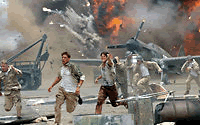

 |
 |
|||||||||
|
|
||||||||||
 |
Review by Jack Foley |
DVD FEATURES: TWO DISC SET.
WORLD War Two gets the Disney treatment in Jerry Bruckheimer's glossy and
oh-so expensive recreation of the devastating events at Pearl Harbor on December
7, 1941 - but the movie becomes a casualty as a result.
Having approved a colossal $140 million budget for making the film and then spending millions more on promoting it, the men behind Pearl Harbor, at Buena Vista, were always there to be shot down by critics but few could have imagined they would be given as much ammunition as they have been to do so.
Technically, the movie is undoubtedly an awesome achievement but in all other aspects, Pearl Harbor is found to be seriously wanting.
Director Michael Bay may be adept at handling explosions (witness Armageddon), but is curiously lame when it comes to human emotions, while Randall Wallace's script is at best inept and at worst, downright insulting.
Historically, the movie is also objectionable, re-writing fact to make America seem more heroic and, worse, victorious just months after one of its darkest hours.
And to make matters worse, the gritty realism of more recent World War Two
films such as Saving Private Ryan and The Thin Red Line has been replaced
by gung-ho heroics and a reluctance to dwell upon the nastier elements of
combat, as well as a limp and fictitious love story designed to cater for
The Titanic loving masses.
Ben Affleck, Josh Hartnett and Kate Beckinsale are at the centre of the story, forming a love triangle which is destined to end in heart-ache. Affleck, as high flying Rafe McCawley, and Hartnett, as childhood best friend Danny Walker, make for an inseparable double act, hopelessly devoted to their `wings'.
When Beckinsale's nurse, Evelyn Johnson, bends the rules to allow McCawley to pass his medical, the love-struck pilot duly becomes smitten and begins an affair, but then volunteers for service in England and is later presumed killed in action. Re-enter Walker, the man McCawley has chosen to deliver any bad news, who falls for the mournful nurse himself.
Friendship and loyalty is then put to the test when McCawley returns to disrupt the happy couple and then the Japanese launch their surprise offensive.
Taken solely as a summer blockbuster, Pearl Harbor delivers everything that it should - action, drama and a big, old fashioned romance. However, it has been made with one thing in mind, money; and with one real audience in mind, American.
Attempts are made to pander to the Japanese by briefly alluding to the motivations behind the attack, while America's reluctance to become involved in the European conflict is also given an airing. But these feel like token gestures designed to keep an eye on the world-wide grosses.
In all other areas, Pearl Harbor is unashamedly pro-American, so much so that RAF pilots are given to spouting putrid lines such as, "if there are more like you over there, then God help anyone who goes to war with America"; while victorious Japanese commanders are forced to concede that "I fear all we have done is awaken a sleeping giant".
Even the visually-impressive 45-minute bombing sequence - when jaws will drop in amazement, rather than horror - succumbs to moments of sickening patriotism as fallen servicemen drown under a bullet-ridden American flag, or cheer on comrades as they shoot down the occasional Japanese Zero.
Gone is the horror of war, the sense of loss, of despair, or even defeat. Men and women die, but not horribly, just heroically. Bay's camera technique is such that he seems reluctant to show the true extent of the injuries, thus diminishing the impact of the tragedy which really unfolded. To make matters worse, his nurses - and Beckinsale in particular - are allowed to tend to casualties without so much as smudging their lipstick.
And to cap it all off, America's revenge mission - a desperate attempt to save face by bombing Tokyo led by Alec Baldwin's cliche-spewing Jimmy Doolittle - is depicted as the turning point of the war; "the moment when Japan knew it could lose and America realised it could win".
For Bay and Bruckheimer, the making of Pearl Harbor was something of a labour of love. They were determined not to dishonour the memory of those who lost their lives.
And while patriotic Americans seem to be lapping it up at the US Box Office (it took $75 million in its opening weekend), it's hard to know what any veteran will make of it. Had director and producer concentrated more on fact rather than fiction, it might have fared better.
As it stands, Pearl Harbor is worth seeing on the big screen for its attack sequence alone, but whether it stands the test of time, or even warrants repeat viewing, remains to be seen. It's big, it's brash and it's loud but ultimately, like its primary subject matter, it bombs!